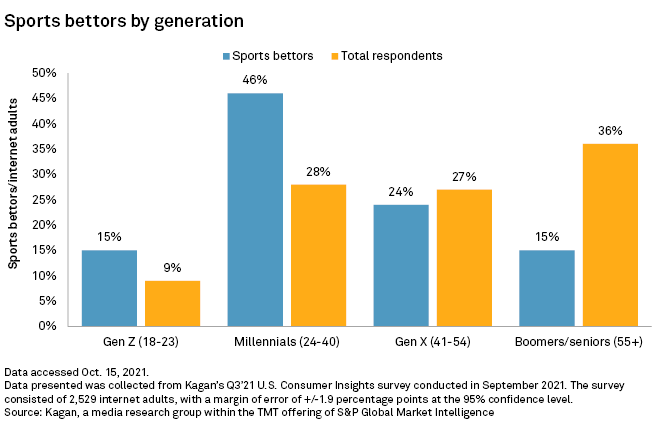
As a 22-year-old college senior and sports fanatic, I was intrigued when my home state of New York legalized sports betting. Unfortunately, I had no idea how much time I would spend on sports betting weekly. I was unaware of the ramifications sports betting could have on an individual’s mental health, mine included. I generally am a happy person. However, once I started to sports bet, I saw that happiness start to go away. With every bet, my heart would start to race. Even though the amount of money on the bets was not the biggest, I was still losing money. Sports betting is essentially a game of chance, and is taking over… but at what cost?
I have seen firsthand people obsess over sports betting. One of my friends would constantly be on a sportsbook trying to figure out the next thing to bet on. They completely changed the way they act. They would no longer be the fun and exciting person they once were. After losing all these bets, they turned into a miserable and depressed individual. In the long run, frequent sports betting is detrimental to your health. As more states start legalizing sports betting, the mental health of individuals involved will continue to dwindle.
What is Sports Betting
Sports betting is the act of trying to predict the results of a sports game and placing a wager on the event. People can bet on all types of sports, with Baseball, Hockey, Football, and Basketball being the most popular. People can place their bets through illegal websites or regulated platforms such as DraftKings, FanDuel, MGM, and Caesars.
People bet because they like to take risks. Sports betting is one of the most dynamic ways to take risks. Bets could be for as little as one dollar or as much as one million dollars. Sports betting is a leisurely activity for many. There is a saying that money won is sweeter than money earned. With bets that win, one can make a month’s salary in the span of a few hours.
Why Sports Betting was Illegal
Betting started to become illegal because of The Federal Wire Act of 1961. The Federal Wire Act criminalized using interstate telephone lines to operate a betting or wagering business. This Act was specifically created to put an end to organized crimes. It assisted states in carrying out and enforcing sports betting laws.
Sports betting was officially made illegal in 1992 by the Professional and Amateur Sports Protection Act (PASPA). According to Pete Blackburn, PASPA was established to “Prohibit states from being able to “sponsor, operate, advertise, promote, license, or authorize by law” the act of gambling on sports.” In other words, it prevented states from overriding federal laws. When PASPA was created, Nevada was the only state with legal sports gambling as it was grandfathered in.
The integrity of the game also played a significant role in why sports betting was illegal. Professional sports leagues insisted that gambling was bad for their game. They believed that allowing betting would cause games to be fixed. If a game is fixed, it takes away the authenticity of the ending, which is where the excitement of a game is born. The commissioners of the four major sports leagues were not happy either, with David Stern — National Basketball Association Commissioner at the time — saying that sports gambling was a national problem.
Federal Court Reverses Ban on Sports Betting
There were various reasons why the U.S. Supreme Court reversed the decision to make sports betting legal. One reason was the rise of illegal gambling sites. People were wagering hundreds of millions, if not billions of dollars, on illegal sites rather than through a regulated site. On a regulated, government-run site, the U.S would make money through lost bets rather than it going to an illegal source.
The government realized that legalizing sports betting would result in significant revenue. Gambling taxation represents a significant share of the state government’s tax revenue, and it would help stimulate the economy as it is one of the most significant revenue-generating industries.
Betting scandals also played a significant role in overturning the ruling on sports betting. Some major scandals include the 1919 Chicago Black Sox Scandal, the CCNY Point-Shaving Scandal, and MLB Legend Pete Rose betting on his team’s games,
In 2012, former New Jersey governor Chris Christie signed legislation attempting to legalize sports betting in New Jersey but was sued by the NCAA and the four major sports leagues — Football, Baseball, Basketball, and Hockey — shortly after. On May 14th, 2018, the U.S. Supreme Court overturned the federal ban on sports gambling by a vote of 6–3.
The commissioners of the four major sports leagues have different opinions about sports betting. In a 2014 New York Times op-ed, NBA Commissioner Adam Silver wrote, “I believe that sports betting should be brought out from the underground and into the sunlight where it can be appropriately monitored and regulated.” MLB Commissioner Rob Manfred agreed with Adam Silver, noting that illegal sports betting makes the opposition to betting meaningless. The NFL still maintains a public opposition to sports betting, which is ironic. Not only do they have a team in Las Vegas — A city known for betting — but they are also the league that is bet on the most. The NHL has not released a statement about whether they are for or against sports betting. However, commissioner Gary Bettman mentioned that they are smaller than other major sports leagues, making them less vulnerable to any negative issues from legal sports betting.
States and Sports Betting
The federal government has legalized sports betting, but it is now up to the individual states to decide if they want sports betting to be legal in their states. Roughly 58% of adults — just over 191 million— in the United States live in states with legalized sports betting.

There are currently 15 states where both in-person and mobile sports betting is legal. These states have seen extensive revenue growth from having multiple sports betting options.
Three states currently only have mobile sports betting. The primary benefit to mobile sports betting is that you can place a bet from the comfort of your home.
Eleven states have only in-person betting. The main struggle with in-person betting is that you could be waiting in line for hours to place a bet, even one as little as $5. While not as accessible as mobile sports betting, in-person betting benefits from being set at a stadium as there are no distractions from the outside. It is just you and the game.
Nebraska, Ohio, and Wisconsin are on the verge of legalizing sports betting. These states are awaiting further action by regulators. Individuals in these states are forced to bet illegally because they are stuck in limbo, waiting for a final decision by regulators regarding the legalization of sports betting.
The remaining 18 states have no affiliation to sports betting. Individuals in these states have no choice but to bet illegally as there is no timeline as to when sports betting will become legal.
Advertisements for Sports Betting
Advertisements for sports betting are seen everywhere. If you have watched television at any point in the past year, you likely have been overwhelmed with advertisements for sports betting, and not just during the games. Advertisers are smart with making their commercials, but there must be a limit to how many advertisements there can be.
Sports betting sites are competing for customers. This has led Bill Miller, the President of the American Gaming Association, to say “… the current level of sports betting ads “an unsustainable arms race.” The four major betting companies — DraftKings, FanDuel, Caesars, MGM — have spent hundreds of millions of dollars over the past year with celebrity-filled advertisements. The floodgates for sports betting opened once the NFL agreed to allow ads for sports betting on its broadcasts. If your favorite player promotes something, you will likely listen to them.
According to the New York Times, with over 50% of U.S. adults living in places where sports betting is legal, the sports betting industry hit $1.5 billion in revenue. These companies have been strategic to make sports betting seem the same as a basic task. However, the difference is that gambling addiction can cause suffering in individuals’ lives. The incentives shown in advertisements play a significant role in creating gambling addicts. The problem lies with gambling “hooks.” These companies understand that the more bets someone places, the more dopamine is released in the brain. Not everyone who sees an ad for sports betting, nor everyone who sports bets, will become addicted. However, it is hard not to become addicted when constantly seeing advertisements.
Sports Betting Addictions

The easy accessibility to gambling products, accompanied by aggressive advertising, creates a situation where many people are susceptible to becoming gambling addicts.
The brain is negatively affected when sports betting. According to Jack O’Donnell, “The Neuroscience of gambling Is exactly the same as other addictive behaviors, such as drugs, alcohol, sex and eating… when one gambles, the brain releases dopamine, which is a feel-good neurotransmitter that makes you feel excited.” People want to try to achieve that same level of happiness repeatedly, leading individuals to bet constantly, even when it is not in their best interest. Over time, one can develop a gambling tolerance, meaning the brain has become so accustomed to dopamine that it does not produce the same thrill it is supposed to.
Gambling addictions can be worse than an addiction to alcohol or drugs. Sports betting is dangerous, with Dana Benbow saying, “Non-addicts see it as a behavioral choice to bet and not a mental disease, though the American Psychiatric Association classified compulsive gambling as a psychological disorder in 1980.”
Gambling addicts have had their lives ruined because of sports betting. O’Donnell also mentioned that “It is estimated that at least 2.5 million Americans have a severe addiction to gambling. But most experts agree the number is likely much larger.” One individual who had their life ruined from sports betting was 37-year-old, Steven Delaney. Delaney does not even associate himself with sports anymore. According to Keith Whyte — executive director of the National Council on Problem Gambling — “About 2 percent of Americans, roughly 6.6 million people, struggle with gambling addiction.” Delaney said, “It was like two people in my brain. Now I realize it was the addiction trying to fight against whoever I really am.” At first, Delaney’s addiction was easy to hide. He was gambling away the family 401K without his wife knowing until his wife uncovered his addictions after reading his email. Delaney was relieved that he no longer had to hide this obsession. He has since hosted a new podcast that focuses on helping addicted gamblers turn their lives around.
A severe gambling problem can cause bad anxiety, which leads to despair. This has the potential to lead to a gambling-related suicide. For most gamblers, betting is a recreational activity, but gambling can cause financial stress and social misery when it becomes too frequent. Studies have shown that problem gamblers have the highest suicide rate of any addiction disorder. There is no limit to how much money can be placed on a wager. For gambling suicides to stop, there must be a limit to how much a user can wager on a bet, saving addicts from economic ruin. It is crucial to make people aware of the pressing issues that get pushed to the side, especially since young adults in college are now subject to the dangers of sports betting.
College Students and Gambling
College Students are one of the most susceptible groups to sports betting. Advertisements from sports betting companies are targeted at young adults, primarily college students. These advertisements use pictures and videos that appeal to college students, hooking them into the sports betting world. With companies offering incentives, more college students are drawn to it. College kids have plenty of free time, so they may find themselves betting on sports to pass the time.

Most college students do not turn 21 until their junior and senior years. To legally bet, one must be 21. Many college students are forced to rely on illegal sites throughout their early college years. College is a place where students try new things. If people around them are sports betting, they will want to get in on the action. Research from the International Center for Responsible Gaming estimates “that 6 percent of college students in the U.S. have a serious gambling problem that can result in psychological difficulties, unmanageable debt and failing grades.”
College students tend to drink a lot of alcohol. It is a part of the culture on campuses. Having a large amount of alcohol impacts your cognitive and motor functions by causing them to slow down. One of the effects of intoxication is impulsive behavior, leading college students to bet far more than they usually would.
My generation is obsessed with money and sports. Because of this, betting on sports has become a common theme for college students. What faster way to make money than betting on a sports game that takes only a few hours? To many, it sounds preferable to working 40 hours per week only to make a tiny fraction of what you can win from a well-placed bet. Sports betting is all luck. You can have all the facts and almost be sure that you are picking a winner, just for there to be an upset. In sports, you should always expect the unexpected. With sports betting, you should always expect to lose.
What’s Next
As more states start to legalize sports betting in the coming years, we will continue to see rising cases of gambling addictions. It will not be long until everyone in the United States can bet legally. States are guaranteed to see a significant revenue increase through taxes based on legal gambling revenue as more states legalize gambling.
If the current trend in sports betting continues, mental health issues will soon go hand in hand with sports betting. The key to avoiding this is to avoid sports betting, no matter how hard it may be. If you need help to stop betting, seek that help as it will be better for you in the long run. Gambling addictions are not easy to quit, but if you put in the time and effort, you will be able to quit sports betting and get rid of the addiction.
Sometimes, I wonder if sports betting should still be illegal. If it was, we might not be seeing mental health issues continue to rise. I am constantly surrounded by sports betting. I have made my fair share of bets but have realized that I should not be betting as it has taken a toll on me. Seeing the dangers of sports betting firsthand has made me wonder why I got into sports betting in the first place. The answer is not only because of advertisements I saw but also because of the people around me. I saw myself going down a dark path. I am lucky I was able to stop myself from going down that path further. Others might not be as fortunate.
